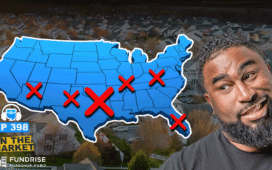You have finally decided to enter the short-term rental (STR) market, and your biggest concern is a call from the local fire department stating that your house is ablaze or that your guest is suing you for a twisted ankle during their stay. Luckily, if you prepare with the proper insurance and care for your property, these types of situations can be managed.
Listing your property on Airbnb can bring in extra income—and extra headaches if you are not covered properly. Don’t rely on your regular homeowner’s insurance since it won’t cover the unique risks involved. Before renting, review your policy and look into add-ons or endorsements.
In this article presented by Baselane, we’ll discuss the details of Airbnb’s limited insurance coverage and guide you through essential considerations like vandalism, theft, unpaid rentals, and guest injuries. We’ll also highlight the best insurance options tailored to Airbnb hosts so you can protect yourself from costly surprises and potential losses.
Does Airbnb Offer Insurance for Hosts?
The short answer is yes, but you need to understand its complexities.
Airbnb offers two main types of coverage: Host Damage Protection, which covers up to $3 million in guest-related damage, and Host Liability Insurance, providing up to $1 million in coverage for injuries or property damage affecting guests.
Host Damage Protection
What it covers:
- Property damage from guests
- Vehicle damage if caused by guests
- Extra cleaning fees due to guests’ actions
- Lost income if you must cancel future bookings due to damage
What’s not covered:
- Normal wear and tear
- Loss of money or currency
- Damage from natural disasters
The claims process can be complicated, so it’s crucial to understand what’s covered and not to save yourself time and prepare for anything that comes up. There are several things to note about filing claims, such as only having 14 days to file and needing proper documentation for the costs of repairs. This can be as simple as an invoice from your cleaner for extra work or your handyperson for having to fix the hole in the wall—the one the guest has “no clue” where it came from.
Host Liability Insurance
What it covers:
- Guest injuries.
- Damage to guest belongings.
- Damage to shared areas or nearby properties caused by guests.
What’s not covered:
- Intentional damage or harm.
- Damage to your own property (this is under Host Damage Protection).
- Exclusions for things like data loss or assault-related incidents.
To file a claim, you’ll need to fill out Airbnb’s liability insurance form, which will be handled by a third-party insurer. Even then, you still may not be covered for various reasons, so I wouldn’t recommend relying on Airbnb to save you in every circumstance.
Experience Liability Insurance
Airbnb also offers Experience Liability Insurance, which provides up to $1 million in coverage for injuries or property damage occurring during an Airbnb Experience. This includes online and in-person events, with protection extending to co-hosts as well.
What it covers:
- Guest injuries.
- Damage to guest belongings.
- Costs related to preparing and cleaning up after experiences.
- Virtual events.
What’s not covered:
- Intentional damages or harm.
- Damage to your own property.
- High-risk activities like extreme sports.
For both types of insurance, you’ll need to submit claims through Airbnb’s platform, and there are certain things to note about timelines to report a claim.
Types of Insurance You May Need
Depending on how you use your property, different types of insurance will be necessary:
- Homeowner’s insurance is the basis needed, but you need to take it further.
- An endorsement to your policy may be needed for shorter-term rentals (less than six months).
- Landlord insurance is necessary if you rent long-term.
- Business insurance may be required for regularly renting your property for income and need extra liability insurance. I always recommend a commercial policy with an additional umbrella policy.
What Airbnb’s AirCover Doesn’t Cover
While Airbnb’s AirCover insurance offers basic protection, it doesn’t cover everything. Exclusions include wear and tear, loss of income, and personal injuries unrelated to guests. AirCover also won’t protect against intentional acts, gross negligence, or illegal activities. Plus, the $1 million cap may be insufficient in serious cases, so you might want external home insurance for full coverage.
AirCover is also notorious for denying claims that do not have sufficient evidence or documentation needed to support the claim.
Common Issues Airbnb Hosts Experience
Hosting guests can lead to various issues, from small nuisances to full-blown nightmares. Here are a few common problems:
- Vandalism: Property damage caused by unruly guests or unauthorized parties.
- Theft: Guests may steal anything from small items to high-value possessions.
- Unpaid rentals: Sometimes, guests refuse to pay, affecting your income.
- Bodily injuries: Hosts can be liable for guest injuries.
- Damage to your property: Whether accidental or intentional, property damage is a real risk.
If your property is vacant between stays, problems like mold, broken pipes, or faulty appliances can also arise.
Best Airbnb Insurance Options
To protect your investment, you’ll need insurance tailored specifically for short-term rentals. Here are some top providers:
- Obie: Offers customizable coverage with fast, online quotes and ideal for Airbnb hosts.
- Proper Insurance: Known for comprehensive coverage, Proper is a bit more expensive but offers protection for theft, liability, and property damage.
- Liberty Mutual: Specializes in landlord insurance, covering rental properties and loss of income.
- Allstate HostAdvantage: Provides an endorsement for homeowner’s policies, covering personal belongings during rentals.
- Farmers Insurance: Offers landlord policies that cover liability, property damage, and loss of rental income.
If you are having trouble finding the right insurance or a quote that makes sense to you, I would reach out to an insurance broker in your state who can help price out different options for you.
Final Thoughts
Choosing the right insurance policy depends on your specific situation, so be sure to compare coverage options, costs, and risks before making a decision. A solid insurance plan is essential to keeping your property—and peace of mind—intact as an Airbnb host.
The great thing about insurance is that it can be deducted as an expense in your investment bookkeeping. You need to make sure to track all of your expenses, like insurance, in a simplified manner. That is where Baselane comes in as the perfect solution!
Note By BiggerPockets: These are opinions written by the author and do not necessarily represent the opinions of BiggerPockets.








Recent Comments